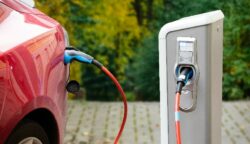Making the Smart Grid Relevant to Mainstream
February 18, 2021 | Energy
Governments around the world are implementing policies to enhance electric vehicle adoption to reduce the emissions that contribute to climate change and ecological damage. Global sales of battery electric vehicles (BEV) and other EVs are expected to have reached nearly 2.5 million in 2020, according to IHS Markit, and then rise by about 70% in 2021. Side by side with this continuing global expansion is the rise of EV charging infrastructures – critical to EV adoption – and with it, an entire EV charging ecosystem of businesses and service providers.
Forward-thinking US utilities that are required or have committed to lower or zero carbon emissions over the next decades have also realized that in order to achieve these goals, they should be championing the electrification of the transportation sector. As with any challenge, opportunities exist for those willing to invest in electric vehicle infrastructure and customer engagement.
these goals, they should be championing the electrification of the transportation sector. As with any challenge, opportunities exist for those willing to invest in electric vehicle infrastructure and customer engagement.
In a recent Apogee webinar with Siemens, Chris King, Siemens’ SVP – eMobility Strategic Partnership and Joel Gilbert, Apogee’s President and Chief Software Architect discussed how customer engagement through digital communications can help utilities unlock this opportunity and encourage EV purchases.
Key points from the presentation included:
- The ecosystem of EV charging requires a full range of EV charging products and services and interconnection planning.
- EVs are reaching a tipping point where the cost of an electric vehicle will drop below the cost of a conventional gas vehicle.
- There are significant benefits of EV charging passed on to non-EV owing ratepayers when avoiding charging during the on-peak periods.
- A Siemens study that considered a city of 20,000 people where 50% of cars were EVs concluded that significant peak demand would result.
- Smart charging allows utilities to manage significant peaks effectively, providing two-way data communications, remote control of a charger to avoid charging during peak hours, and some metering capabilities.
- Digital outbound communication is essential to make customers aware of programs designed to make the consumer experience as easy as possible and EV ownership even more economical. Communication also plays a major role in the increase of EV adoption.
- Xcel and Cobb Energy’s case studies were presented as two examples of successful programs that help EVs break into the mainstream.
If you would like to listen to the presentation in its entirety you can download the recording here or contact info@apogee.net for more information.
About The Author
Kate Panaousis, Marketing Analyst, Apogee Interactive, Inc.
Kate’s responsibilities include coordinating with the Marketing Department in developing the company’s marketing plan and positioning strategy, while she also provides market research and sales team support. She is a graduate of Panteion University of Athens, Greece with a master’s degree in Applied Economics and Management and a graduate of Aristotle University of Thessaloniki, Greece with a bachelor’s degree in Economics. Kate loves geography, traveling and outdoor recreational activities.
 these goals, they should be championing the electrification of the transportation sector. As with any challenge, opportunities exist for those willing to invest in electric vehicle infrastructure and customer engagement.
these goals, they should be championing the electrification of the transportation sector. As with any challenge, opportunities exist for those willing to invest in electric vehicle infrastructure and customer engagement.